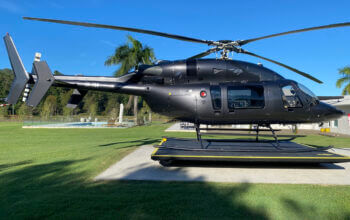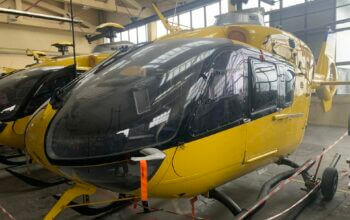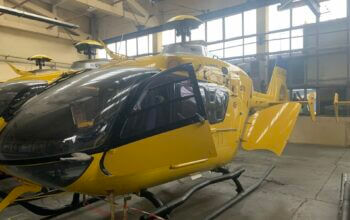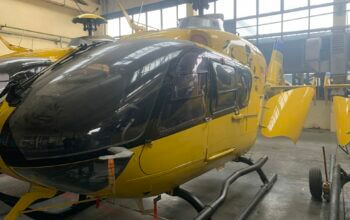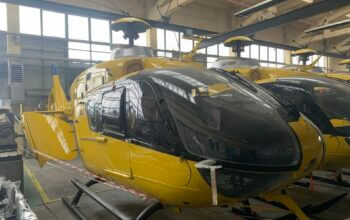Estimated reading time 24 minutes, 9 seconds.
Sometimes you just know a good thing when you see it. It was like that when Frank Kelner first laid eyes on the Pilatus PC-12. He knew without a doubt that the Swiss-made aircraft would prove to be a good thing for Canadian aviation.
Kelner, 56, is known in most industry circles as a Canadian aviation pioneer. There have been many highs over the span of his 39-year aviation career, but introducing the PC-12 single-engine turboprop to Canada definitely makes the short list.
At just 16 years old, Kelner got his first job as a helper on a de Havilland Canada DHC-3 Otter, operated by Fecteau Transport in his hometown of Chibougamau, Que. He spent much of his early flying days in Canada vast northlands, piloting not just Otters but other venerable craft such as de Havilland Canada DHC-2 Beavers, Cessna 180s, the Douglas DC-3 and DC-4, and the Hawker Siddeley 748.
In 1985, Kelner bought Pickle Lake Air Services in Pickle Lake, Ont., about 530 kilometres north of Thunder Bay, Ont. He renamed it V. Kelner Air Services the V is a tribute to his dad, Victor, a recreational pilot who was never able to pursue a flying career and built it into the town largest employer with more than 150 staff. The operation had the distinction of being the first commercial Cessna Caravan operator in Canada, and Kelner spearheaded the effort to obtain Transport Canada certification for single-engine IFR commercial passenger flights in that aircraft.
On his 40th birthday in 1996, Kelner sold the airline to a First Nations conglomerate that launched the present-day Wasaya Airways. Too young to retire, and with aviation in his blood, Kelner started looking for his next big challenge.
He moved to Goose Bay, Labrador and began assembling a fleet of aircraft to launch another airline. There, he crossed paths with a Swiss aircraft, the Pilatus, which regularly made the trek between the factory in Switzerland and its Denver, Colo., finishing plant. Every time it stopped for fuel in Goose Bay, it got Kelner attention.
Canadian Debut
One day, I called Pilatus because they were always coming through and never showed me the aircraft, remembered Kelner.
In one of life strange coincidences, Pilatus had actually been about to contact Kelner. Why? Because he had the know-how they needed to get their single-engine craft certified by Transport Canada for commercial passenger operation in IFR conditions. After all, he had done it with the Caravan.
I told them I would help but only if I could be the exclusive Canadian dealer for Pilatus aircraft, said Kelner. In fact, he had done his research and already possessed a letter from Transport Canada which said that if he followed a series of prescribed steps he could have the aircraft certified to fly on instruments, with passengers, within 30 days. That letter was my bargaining power, chuckled Kelner.
The next day, Pilatus representatives landed in Goose Bay to see a man about an airplane. After just a 20-minute test flight, Kelner knew the aircraft might have been made in Switzerland, but it was made for Canada. An agreement was struck, he got his exclusive dealership rights, and he confirmed a deal on the spot for three airplanes. The Swiss craft was set to make its Canadian debut.
I knew the day I signed up with Pilatus that it would be a success, remembered Kelner. The only fear I had was whether the plane itself could perform in our harsh environment. So I arranged that the aircraft had to pass my test first, over a six-month period. If it didn’t, I had an option to get out.
Early Days
Kelner decided to relocate once again, establishing the V. Kelner Pilatus Center in Thunder Bay (CYQT) in late 1996. An outdoorsman, Kelner built a home on a lake and enjoys connecting with nature through hunting and fishing. I know Pilatus would have done a little better if I had lived in Toronto, but I like it up north, he said.
During his first year of operation, Kelner aggressively pounded the tarmac, logging 1,100 hours and 3,300 takeoffs and landings during Pilatus demonstration flights. His efforts resulted in an astounding 25 sales. The Pilatus passed the Kelner test with flying colours.
The Pilatus has range and payload, Kelner explained. That makes it a big hit in Canada because a lot of our flights are long hauls, especially up north.
But sales in the early days were not without their challenges. Kelner repeatedly encountered resistance to the idea of replacing older twin-engine piston aircraft with the single-engine turboprop Pilatus.
This airplane is extremely safe, Kelner said. I was able to demonstrate to Transport that in terms of safety requirements, the Pilatus meets the requirements as good as or better than a twin. In this plane you’re coming off the ground one third slower than everyone else, and touching down one third slower, too, and slower speeds make it safer.
According to a February 2010 report entitled Single Turboprop Powered Aircraft Accident Analysis from aviation data experts Robert E. Breiling Associates, Inc. of Boca Raton, Fla., accident rates for the Pilatus PC-12 and Beechcraft King Air 200 (to use an example of a popular twin) are very similar. For the period up to and including 2009, the PC-12 logged 1.04 accidents per 100,000 hours of flight time, with a fatal accident rate of 0.42. The King Air 200 data shows 0.97 accidents per 100,000 hours of flight time, with a fatal accident rate of 0.29 for that period.
When it comes to safety, Kelner said people underestimate the value of the Pilatus. I work with facts and the facts speak for themselves, he told Canadian Skies.
The Pilatus has proven itself to be a sturdy craft that is at home in the harsh operating conditions of the Canadian north. Operating alongside such bushplane legends as Beavers and Otters, the Pilatus holds its own. Kelner has collected many stories about the aircraft reliability over the years. He said one of the first PC-12s he sold to Nakina Air Service, which operates scheduled and charter air service throughout northwestern Ontario, is the highest-cycled PC-12 in the world. (Nakina, Ont. is about 360 kilometres northeast of Thunder Bay.)
The [Nakina Air Service] machine was parked outside in a snow bank for six or seven years, plugged in, and the only time it came inside the hangar was for maintenance in Thunder Bay every Saturday night, said Kelner. It is the best airplane I have ever seen. The cost of operation has remained consistent, and it has just had a life extension.
In late December, Nakina Air Service took delivery of a new PC-12 NG (Next Generation model), which is used to service the airline scheduled routes.
Getting the Word Out
V. Kelner Pilatus Center and its capabilities expanded as sales picked up and the Pilatus began to make inroads in the Canadian market.
Steve Davey, the company current vice president and director of maintenance, is a long-time employee who has worked for various Kelner companies since 1989. When the Pilatus Center was founded, Davey was glad to come on board in Thunder Bay. He remembers those days as exciting times.
We definitely had our teething pains with the airplane, said Davey. We were scrambling. We were a small company with a lot of customers who were operating the aircraft at the same time. We were definitely a 24/7 service and technical support business. Our techs went through the initial factory training and it didn’t take long to learn the aircraft because the planes were flying many hours.
The company mandate at the time was to get the word out about this unique aircraft and its suitability for a number of different missions.
Current company president and CEO, Robert Arnone, came on board in 1998 as VP finance. It was a lot of hard work [in the beginning], he said. It involved a lot of education, building on the organization, and building the support network. As the aircraft went into operation, it became more and more accepted.
Arnone explained that Canadian operators were impressed by the Pilatus’ versatility. It can get into short, unimproved runways and it efficient and economical to operate. Initially, the focus was on commercial aviation, but then it grew into a business aircraft. The PC-12 can go anywhere, and the large cargo door, range and spacious cabin all combine to make it the ideal air medical transport aircraft.
Indeed, the PC-12 has proven itself as a highly adaptable machine. In addition to transporting airline passengers on scheduled routes, air medical operators find the aircraft an attractive option for several reasons. The oversized 4’5 x 4’4 cargo door allows for easy loading of stretchers and wheelchairs. With a cabin volume of 330 cubic feet, the spacious interior accommodates medical equipment, personnel and patients quite comfortably. In addition to its ability to get in and out of remote locations and its economical operating costs, the PC-12 also scores points in the air medical arena because of its dispatch reliability which is a critical factor for these operators.
The PC-12 is equally at home in a corporate configuration. Its versatility is such that it could deliver parts and technicians to a remote northern mining camp in the morning, while returning to the heart of Toronto that afternoon. With a 1500-mile range, corporate operators are finding they can do more with the Pilatus for less making it ideally suited to today budget-conscious corporate flight departments. Although several business aircraft configurations are possible, the most popular is what Pilatus calls the Executive 6 which features six club seats, three table trays, power connections for electronic equipment and a separate, fully enclosed, flushing lavatory.
Branching Out
After a decade of building the Pilatus brand in Canada, Frank Kelner sold the majority interest in the company to Arnone and Davey in 2006. The organization was rebranded as Pilatus Centre Canada (PCC). Kelner remains as chairman.
Since the transition, Pilatus Centre Canada has experienced continued growth, branching out with the launch of two associated sister companies in 2008.
V. Kelner Helicopters, located in Thunder Bay, is the focus of Frank Kelner attention these days. The rotary division provides helicopter charters in Ontario, Quebec and the U.S. Initially, Kelner started the rotary arm of the company with one Eurocopter EC120 B. In 2009, an AS350 B3 was purchased, and another in 2011.
After so many years of flying fixed-wing aircraft, Kelner has discovered a love for helicopters. I got hooked and started to realize I could make money. My philosophy has always been different from the average person and what they do. I look at what everyone else is doing and then I do it differently, he said. The helicopter division has had an extreme year. Everyone said it wouldn’t work with the AS350 B3 because it expensive, but we’ve done really well. Long-lining is my specialty, and drilling, exploration, water bombing and bird work.
V. Kelner Helicopters now employs a full-time staff of 14 and operates seven days a week. A Robinson R66 has been ordered and will join the fleet this spring.
Although he busy piloting helicopters these days, Kelner still flies the Pilatus. He logs between 400 and 500 hours of flying per year with a grand total in his logbook of more than 33,000 hours.
Private Air, located at Billy Bishop Toronto City Airport (CYTZ), is PCC second sister company. Also founded in 2008, it was established at the request of private PC-12 owners who were in need of expert aircraft management and maintenance services. The managed fleet also does some private charter work from its home base in Toronto.
One-stop Shop
The corporate headquarters in Thunder Bay is a busy place. Pilatus Centre Canada relocated into a brand new, 19,000 sq. ft. building in June of 2011. Davey says the facility is the key to projecting a quality image. We built within our budget and it a good-sized facility, he said. It works well for us. It allows us to maintain that professional atmosphere.
Within the Thunder Bay facility is a substantial avionics shop, one of the largest between Toronto and Western Canada. PCC handles avionics work for all general aviation aircraft in Northwestern Ontario, from small piston single-engine craft to larger turboprops.
The hangar bustles with activity. With 24 people on staff, PCC maintenance department is a seven-day-a-week, 12-hour-per-day operation, with staff on call for the other 12 hours of each day. PCC is the only Pilatus dealer, besides the factory in Switzerland, that is authorized to carry out PC-12 life extensions.
When aging PC-12s hit their 20,000-hour life limit, they go through an inspection process that will extend their life to 50,000 hours or 60,000 landings. The aircraft is completely disassembled and is in the hangar for eight to 12 weeks, explained Davey. It takes between 1,800 and 2,200 man hours to complete the inspection and typical repairs.
PCC performs rotary maintenance as well, with six engineers dedicated to this division. The company also facilitates aircraft import and export, performs interior conversions and refurbishments, and has completed 20 to 30 medevac configurations on PC-12s over the years.
Maintenance is also provided from a base at Toronto Pearson International Airport (CYYZ), and a satellite service centre at Pro Aircraft Maintenance Ltd., at Boundary Bay Airport (CZBB) in Delta, B.C.
PCC strives to provide customers with a complete range of services. We offer a full turn-key aircraft solution, said Arnone. New and used sales, leasing, management, line and heavy maintenance, structural repairs and modifications, avionics installations and upgrades, PT-6 engine heavy maintenance, aircraft importing and exporting, pre-purchase inspections…. the list goes on.
Davey explained that the push to diversify into several different areas comes from PCC desire to be a one-stop shop. Quality makes us different, he said. As a Pilatus Service Centre we have an obligation to offer a higher quality of work. We hire quality staff and have a quality facility, with better than average service.
Team Approach
Stan Kuliavas is the director of sales at PCC. A licensed private pilot, he joined the organization one year ago and is responsible for all PC-12 sales across Canada. Although he is technically a one-man department for now, Kuliavas said PCC subscribes to a team approach when it comes to aircraft sales and service.
We all work toward a common goal, said Kuliavas. Whether it pilots, maintenance workers or management, everyone can contribute to a sale in their own way. That very evident here from reception to the CEO. Everyone strives to ensure that PC-12 owners and operators are among the best-serviced aircraft owners in Canada.
When he out on a PC-12 sales tour, Kuliavas talks to a lot of industry members. It says something, he commented, that 10 per cent of the worldwide PC-12 fleet is Canadian-controlled. Likewise, the fact that many new PC-12 NG buyers are previous PC-12 owners says something, too.
From 1997 to October 2011, Pilatus Centre Canada imported a grand total of 105 PC-12s to Canada.
If there one thing we know from history, it that Canada has said yes’ to the PC-12. This machine works for us. As more and more people learn about the aircraft flying and operating characteristics, there will be even more sales, concluded Kuliavas.
As for Frank Kelner, the man who introduced the Pilatus PC-12 to Canada, he happy to step back and let that relationship develop under the guidance of Arnone and Davey, while he concentrates on the new rotary venture, V. Kelner Helicopters.
I’m never gonna be in the good books with everybody, he laughed. But I always try to keep my customers happy and do what I do best. That why the partnership [at PCC] works. We’re not all the same. Robert is a suit and tie guy; I’m a bushwhacker; and Steve is big on the maintenance.
At the end of the day, Pilatus Centre Canada has developed its own time-tested and very successful business formula: good products, good people, and good service. Like the Pilatus PC-12 itself, sometimes you just know a good thing when you see it.
Notice a spelling mistake or typo?
Click on the button below to send an email to our team and we will get to it as soon as possible.
Report an error or typoHave a story idea you would like to suggest?
Click on the button below to send an email to our team and we will get to it as soon as possible.
Suggest a story












